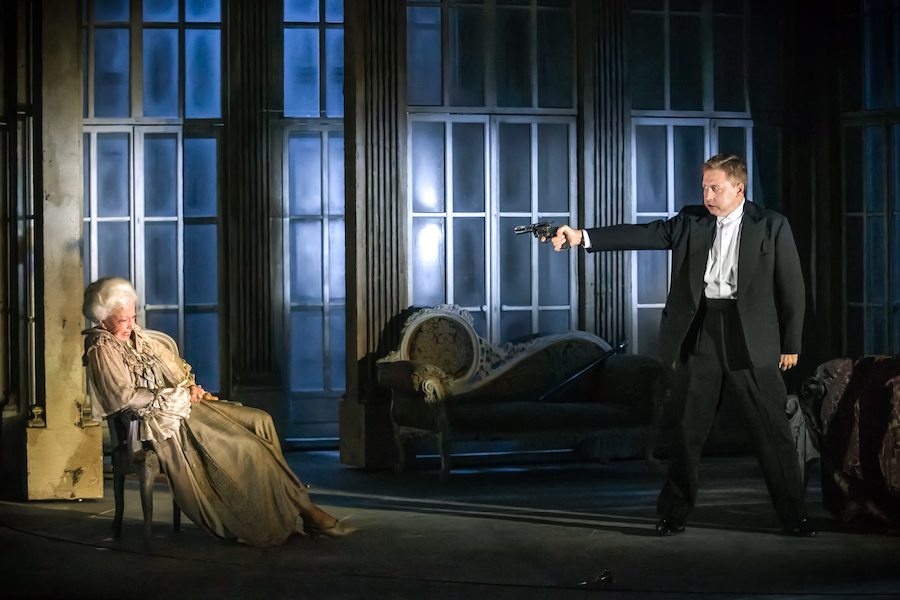Production seen June 23rd 2023 at The Grange, Northington, Hampshire
From afar The Grange at Northington in Hampshire resembles a Grecian temple. But the gently rolling lawns, farmed fields, peaceful lake and trees that surround the impressive neoclassical building couldn’t be anywhere else but in the English countryside. The surprisingly intimate theatre that was constructed in the former conservatory has hosted ambitious opera productions every summer since The Grange Festival started in 2017. This country house festival is now in a league with Glyndebourne, attracting world-class singers while partnering up with the Bournemouth Symphony Orchestra.
Is this the perfect bucolic and country mansion backdrop for Tchaikovsky’s romantic and highly melodramatic opera The Queen of Spades? The fatalistic story – the libretto was written by Tchaikovsky’s brother Modest – takes place in court circles during the reign of Catherine the Great. The director of the current show, Paul Curran, decided to opt for a look that reflects the stylish dress code of 1930s Soviet elite. Does this stylistic cover up solve the problem with the elephant in the (shabby neoclassical) room(s)?
On the night of the premiere of this production the Wagner Group’s leader Jevgenij Prigozhin staged a rebellion against his own country’s Ministry of Defence and army leadership. Since the full scale invasion of Ukraine there has been a very active movement to cancel Russian culture. This may be an overreaction, but one can make a good case for cutting a couple of passages in The Queen of Spades that are slightly problematic in the current situation. In the opening scene the ‘cute’ children march, armed with wooden rifles, through St. Petersburg’s Summer Garden singing: ¨We are here to fight/the enemies of Russia/ The foe is wicked, be on your guard!”
Tchaikovsky was unashamedly patriotic, supported the imperialistic tendencies of the tsarist regime and was an admirer of Catherine the Great (if in doubt, check the libretto and Tchaikovsky’s own writing). I should perhaps add some backstory: Catherine II of Russia conquered Crimea from the Ottoman Empire, extended the Russian territory in several other directions and imposed serfdom on the Ukrainians.
At the end of the ballroom scene in Act II the unscrupulous Empress makes a grand appearance and she is fondly celebrated by the crowd. But how does the director deal with this overtly patriotic tribute? Well, he simply stages a meaningless parody, by turning the unscrupulous Empress into a silly dancing doll dressed like an 18th century aristocratic lady. If you don’t know how to solve (or sing) a ‘problematic’ passage in an opera, you should perhaps consider cutting it.

All that aside, the singing and musicianship in this production is very strong, almost throughout. The Ukrainian tenor Edward Martynyuk needed a little bit of time to settle his voice, playing the Dostoyevskian, obsessive Herman. In the barracks, the mood turned from high Gothic to early expressionism and Martynyuk’s sang in the last act like a man possessed. The love duet was sensitively and passionately performed and I could have been fooled that this was ‘Puccini on the Neva’. The striking Armenian soprano Anush Hovhannisyan as the naïve and willing Liza bore the emotional load of the role with poise and ease.

The Ukrainian baritone Andrei Kymach was a charismatic raconteur as Count Tomsky and the Russian baritone Ilya Kutyuhin as Prince Yeletsky demonstrated the nobleness that Lisa missed out on by dumping him. But the highlight of the evening was the bitter and scowling Countess, interpreted by the 82-year old soprano Josephine Barstow. Her almost whispered reminiscences of better days and reappearance as the Ghost of the Russian Empire Past was unforgettable.
The Bournemouth Symphony Orchestra has few rivals in the UK when it comes to the Russian repertoire thanks to their Ukrainian music director Kirill Karabits. But Paul Daniel is the conductor for this production and he made the orchestral tone glow with a lushness and warmth that could only possibly be matched by the stunning landscaped park at its summer best, which surrounds the opera venue.
Future performances 29 June, July 2
In the interval of all the performances there is ample time for a leisurely picnic-and-champagne supper.
ALBERT EHRNROOTH
